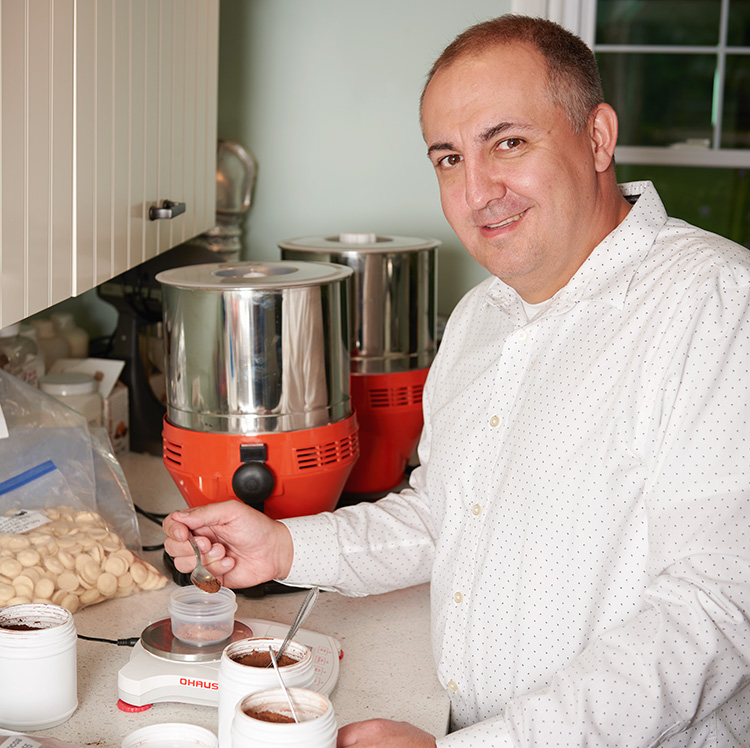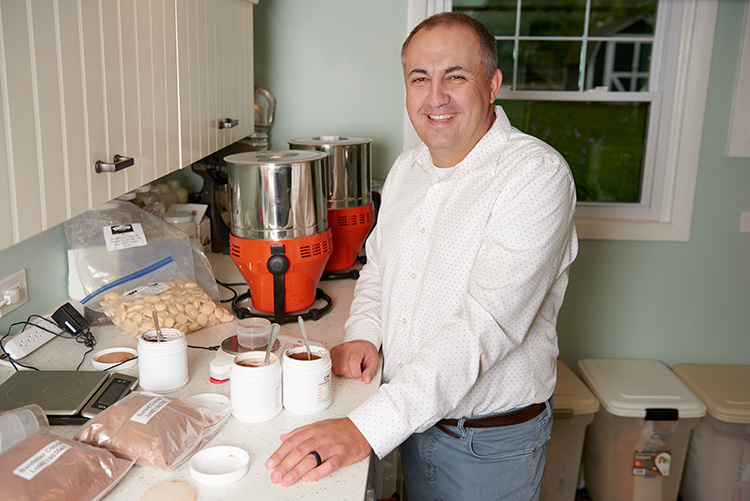
H
e eats chocolate, in one form or another, “every day of my life” and spends about as much time working with it, even when he’s not traveling for his job. All Kazmierczak has to do is walk into the small lab he built in his home on the South Side of Chicago to devise a chocolate product that could be used in a candy bar, snack, or nutrition bar for, say, Pepperidge Farm or PepsiCo, with which he’s helped develop products recently.
Now director of technical sales at JB Cocoa, Kazmierczak never dreamed this could become his career.
“Sometimes I sit back and it’s hard to believe that I’ve gotten as far as I have making chocolate,” Kazmierczak says. “No matter who I talk to and tell them what I do, that always puts a smile on their faces, and they always want to talk about it. I think that’s cool.”
Kazmierczak (MTM ’01, CERT. FST ’02, M.A.S. MTO ’03) took an unconventional path to earn his golden ticket. It was only in his master’s program that he realized working in the food industry could combine the manufacturing and engineering he enjoyed with his growing interest in food technology. And yet the pieces didn’t fully fit together until his first job as a project engineer at Schulze and Burch Biscuit Company, where Kazmierczak saw the possibilities that his training in manufacturing and food technology offered.
“[Customers] would come in with a formulation, and I would help design the way it would be made in the production facility,” he says. “I never knew that existed, and I fell in love with it—the food aspect of it, but the engineering part of it, too.”

Kazmierczak’s inspiration to work in chocolate came through a candy bar collaboration between Schulze and Burch and Nestlé. The experience stuck with Kazmierczak, who took a job at Blommer Chocolate Company in 2005, where he learned the intricacies of producing chocolate through a crash course in the lab and the manufacturing facility. He has spent the last 14 years working at leading chocolate companies, including Barry Callebaut and Nestlé.
Kazmierczak describes his employers as suppliers. Some provide core ingredients for chocolate, such as cocoa powder, cocoa butter, or chocolate liquor; others make the chocolate that snack and candy companies use in their various creations. He has worked in research and development, in industry plants, and with customers to create the chocolate used in their decadent concoctions.
“They’ll have an idea in mind about what they want to do with their finished product, whether it’s hitting a nutritional profile or a flavor profile, or even a finished product texture,” he says, adding that he must also determine whether the product can be produced at the plant.
Former colleague Rob Solomon says Kazmierczak’s knowledge and skill separate him from his fellow formulators in an industry small enough that everyone seemingly knows one another.
“He made my job easy,” says Solomon, who worked with Kazmierczak in the last year at Barchemy, a custom coatings and fillings startup. “Being able to nail the customers’ expectations just from a phone call or me sending notes from a customer conversation, he’s pretty well-versed in formulas that are well-balanced, especially with the flavors.”
Not a bad way to make a living for someone who had little food science training and expected to spend his career in a machine shop.
“I could probably barely make my own dinner,” Kazmierczak says with a laugh, recalling his younger days. He acknowledges that the subsequent years have made a sweet difference in who he is today. “When it comes to chocolate-related stuff, I know pretty much as much as there is.”